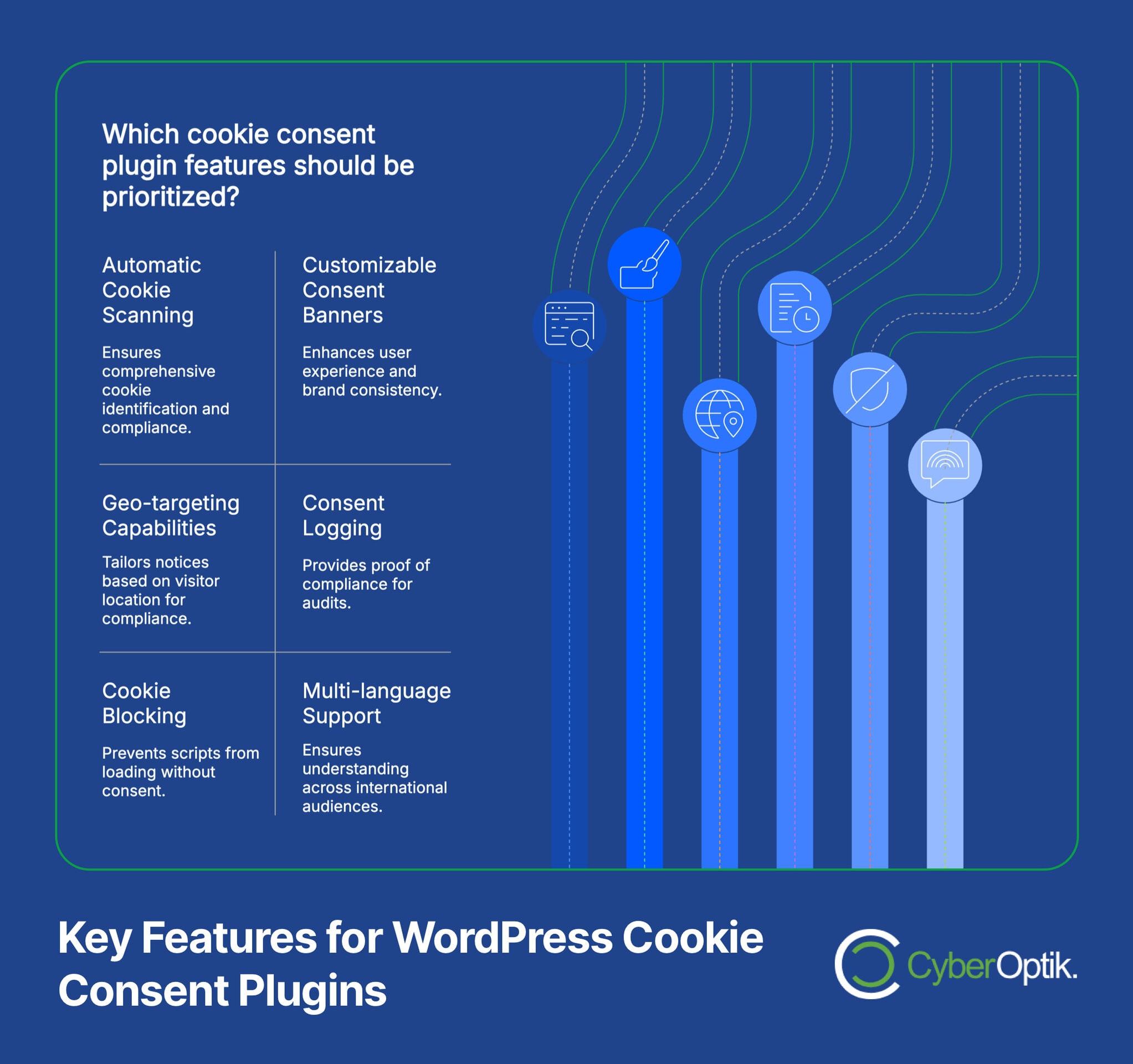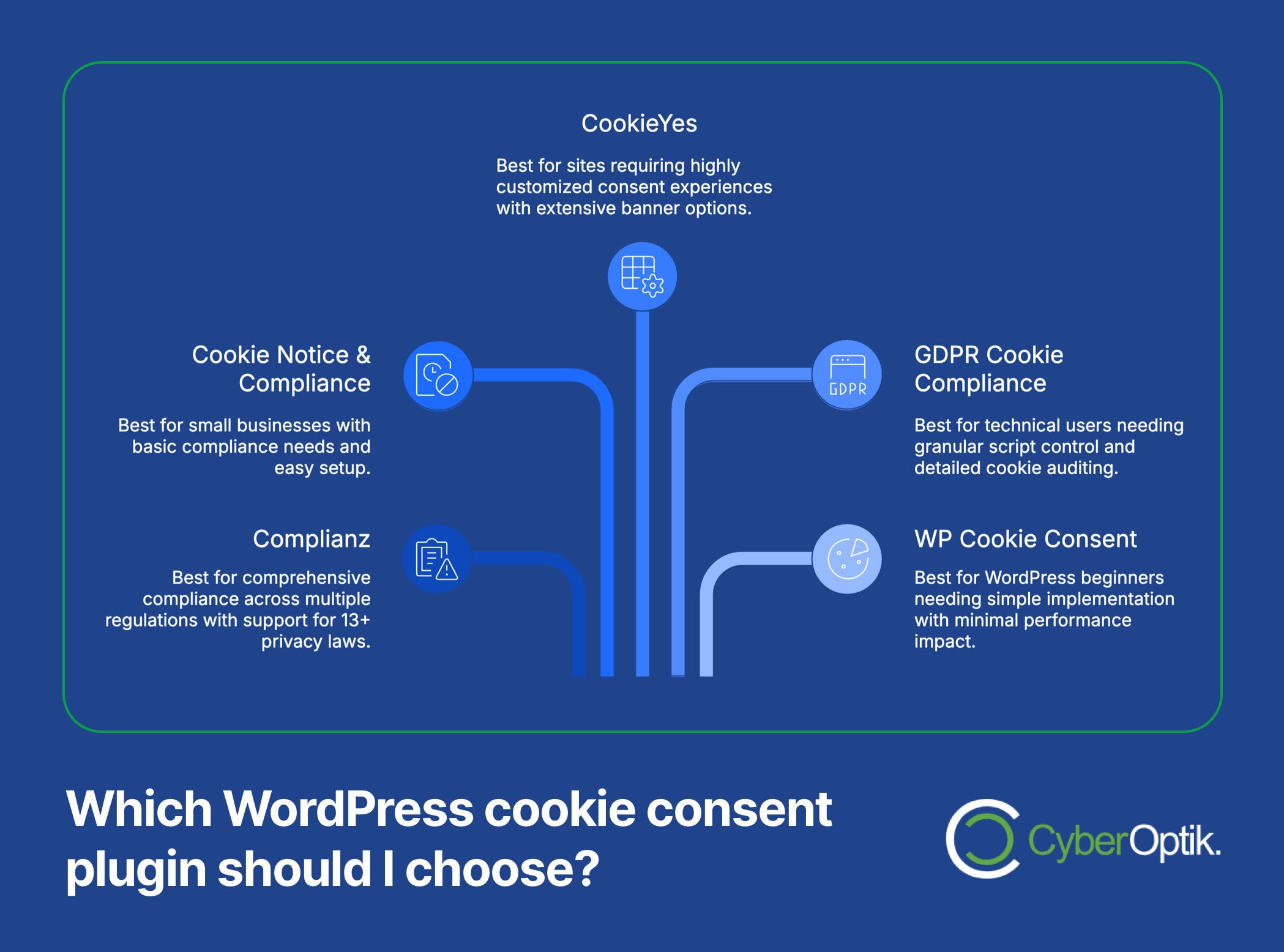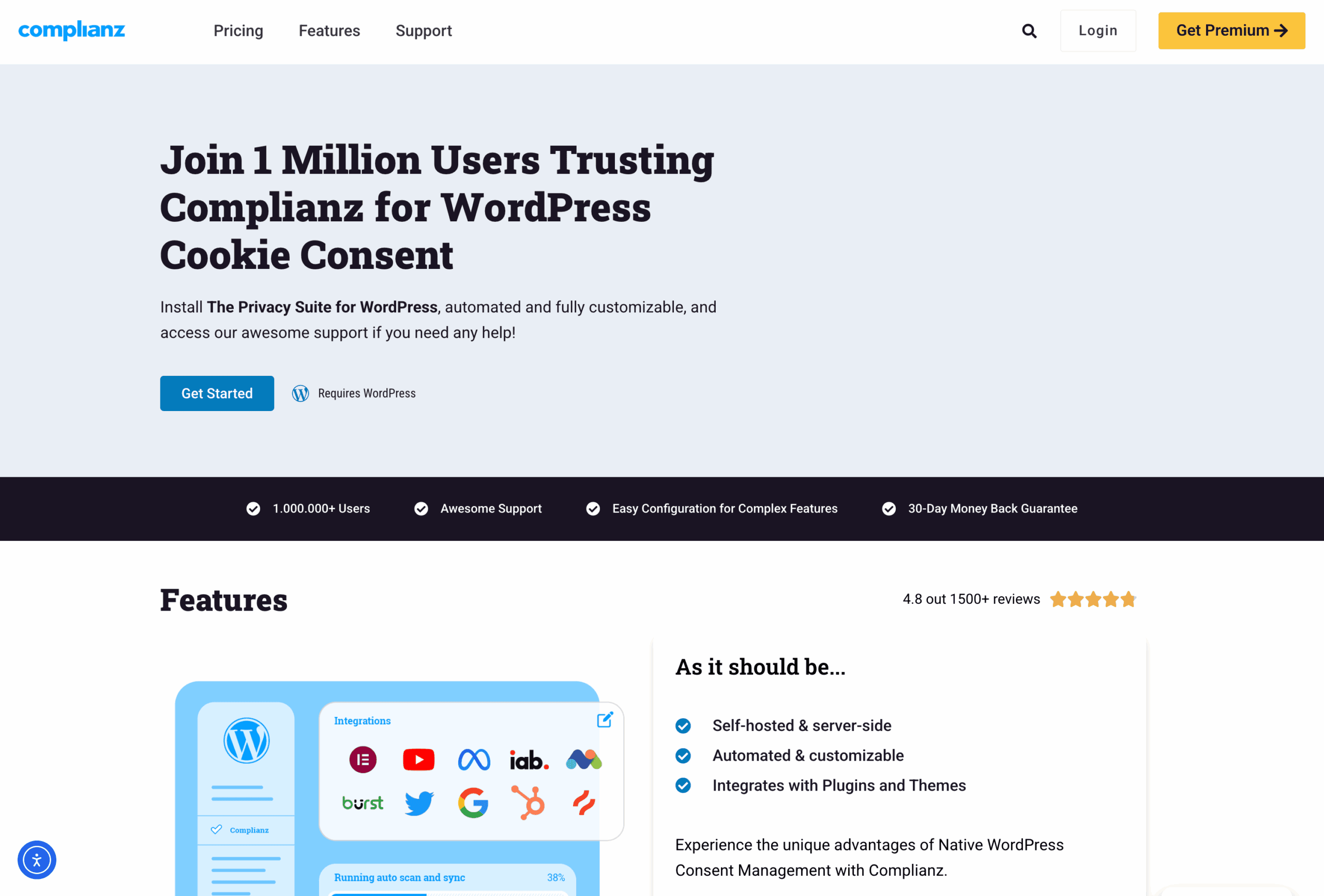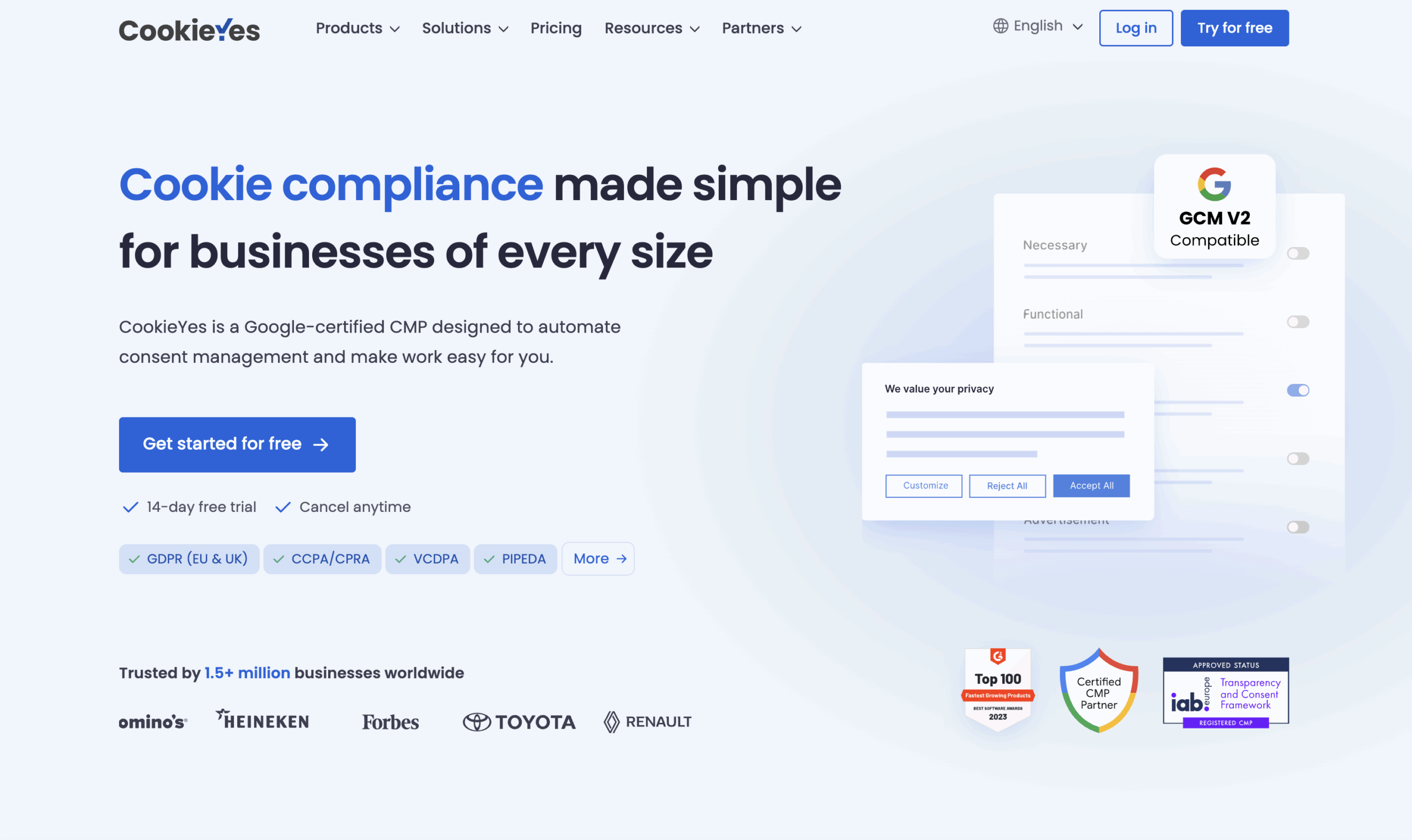Cookie consent management has become a critical component of website compliance. With privacy regulations like GDPR and CCPA enforcing strict rules about data collection, WordPress site owners need reliable cookie plugins to maintain compliance while preserving user experience. The right solution helps you inform visitors about data practices, obtain proper consent, and document these interactions.
In this comprehensive guide, we’ll explore the best cookie plugins for WordPress, help you understand essential features, and provide recommendations based on your specific needs. Whether you’re building a new site or upgrading an existing one, implementing proper cookie consent isn’t just about avoiding penalties—it’s about building trust with your audience.
Why Cookie Consent Plugins Are Essential for WordPress Sites
Cookie consent plugins serve as the bridge between regulatory requirements and user-friendly website experiences. With the emergence of privacy laws across the globe, website owners must take proactive steps to comply with various regulations.
The European Union’s General Data Protection Regulation (GDPR) set a high standard for privacy protection when it launched in 2018. Since then, many regions have followed with their own regulations, including California’s Consumer Privacy Act (CCPA) and Brazil’s Lei Geral de Proteção de Dados (LGPD). These laws share a common theme: websites must inform visitors about data collection and obtain explicit consent.
Failing to comply with these regulations can result in significant consequences. Under GDPR, organizations face fines up to €20 million or 4% of global annual revenue, whichever is higher. Beyond financial penalties, non-compliance risks reputation damage and loss of user trust.
Cookie consent plugins automate much of the compliance process. They scan your WordPress site for cookies, categorize them, create appropriate notices, and log consent actions. This creates a clear record of compliance that can protect your organization during audits or investigations.
Beyond regulatory compliance, these plugins offer several key benefits:
- Enhanced transparency – Users appreciate knowing how their data is being used
- Improved trust – Clear privacy practices build credibility with visitors
- Better user control – Visitors can manage their privacy preferences directly
- Simplified compliance – Technical requirements are handled automatically
- Documentation – Consent records provide proof of compliance
How do I know if my website is using cookies? This is often the first question website owners ask when addressing compliance. Nearly all modern websites use cookies in some form—whether for basic functionality, analytics, or marketing purposes. Even a simple WordPress site typically employs cookies for comment functions, login sessions, and basic measurements.
Key Features to Look for in WordPress Cookie Plugins

When evaluating cookie consent plugins for your WordPress site, certain features stand out as particularly valuable. These capabilities determine how effectively the plugin will maintain compliance while providing a good user experience.
| Feature Category | Why It Matters | Implementation Impact |
|---|---|---|
| Automatic Cookie Scanning | Identifies all cookies and tracking scripts on your site | Reduces manual work and prevents overlooking cookies |
| Customizable Consent Banners | Matches your brand aesthetics and UX requirements | Improves user experience and maintains design consistency |
| Geo-targeting Capabilities | Shows appropriate notices based on visitor location | Prevents unnecessary popups for visitors in non-regulated regions |
| Consent Logging | Maintains records of user consent actions | Provides proof of compliance for audits or investigations |
The most effective cookie plugins provide comprehensive scanning capabilities. This feature automatically detects cookies and scripts running on your website, categorizing them according to purpose (necessary, functional, analytics, marketing, etc.). Automatic scanning reduces the risk of missing cookies that might otherwise go undocumented.
Cookie banner customization options are equally important. A good plugin allows you to adjust the appearance, content, and behavior of consent notices to match your brand. This includes color schemes, button styles, text modifications, and positioning options. The goal is to create notices that feel integrated with your site rather than like disruptive afterthoughts.
With privacy regulations becoming increasingly strict worldwide, implementing proper cookie consent is no longer optional. Different regions have different requirements, making geo-targeted notices valuable. This functionality detects visitor location and displays appropriate consent options based on the applicable regulations in that region.
Consent logging and documentation features create an audit trail of user interactions. These records serve as proof of compliance and can be essential during regulatory investigations. Advanced plugins store information about when consent was given, what choices were made, and from which devices or IP addresses the interactions originated.
Other critical features to consider include:
- Cookie blocking – Preventing scripts from loading until consent is given
- Integration capabilities – Working with analytics, advertising, and marketing platforms
- Multi-language support – Displaying notices in visitors’ preferred languages
- Regular updates – Keeping pace with evolving privacy regulations
- Performance optimization – Minimizing impact on page load times
The concept of integrating compliance elements into a cohesive WordPress design requires thoughtful planning. The most effective implementations balance legal requirements with user experience considerations, creating notices that inform without frustrating visitors.

Top Cookie Consent Plugins for WordPress in 2024
Complianz – GDPR/CCPA Cookie Consent

Complianz stands out as a comprehensive solution for WordPress cookie compliance. This plugin specializes in managing cookie consent for a wide range of regulations including GDPR, CCPA, ePrivacy, and other global requirements.
One of Complianz’s key strengths is its automated cookie detection and banner generation. The plugin scans your website to identify tracking scripts and cookies, then creates appropriate notices based on its findings. This automation significantly reduces the technical knowledge required to achieve compliance.
For businesses targeting global audiences, Complianz offers geo-location based consent banners that comply with regional laws. This means visitors from different jurisdictions see notices tailored to their local regulations, optimizing both compliance and user experience.
The plugin supports compliance with 13+ privacy laws, including GDPR (EU), CCPA/CPRA (USA), LGPD (Brazil), POPIA (South Africa), and PIPEDA (Canada). This broad coverage makes it suitable for websites with international audiences.
Advanced integration features set Complianz apart from basic solutions. The plugin works with Google Consent Mode and IAB Europe’s TCF v2.0 framework, allowing for sophisticated consent management with advertising and analytics platforms. It also maintains records of consent registration and works with “Proof of Consent” tools to create a clear compliance audit trail.
For privacy-conscious websites, Complianz respects browser-level controls like “Do Not Track” and “Global Privacy Control,” adding an additional layer of user preference recognition. This attention to detail helps build trust with privacy-aware visitors.
However, users should be aware of some limitations. Some users report inconsistent cookie scan results, with random cookie counts (ranging from 9 to 30) and occasional failures to clear stored cookies from the database.
Within the WordPress community, Complianz has established itself as a “popular alternative to Borlabs Cookie and Real Cookie Banner” thanks to its comprehensive legal coverage.
The plugin offers both free and premium versions, with the paid options providing additional features like A/B testing for consent banners, more customization options, and priority support.
Cookie Notice & Compliance for GDPR/CCPA

Cookie Notice offers a streamlined approach to cookie consent management. This plugin provides the essential functionality needed for basic compliance without overwhelming users with complex settings.
Its straightforward interface makes it accessible for WordPress beginners. Setup requires minimal configuration, with options to customize the appearance and behavior of consent notices without diving into technical details.
The plugin includes customizable cookie consent banners, basic consent logging, cookie expiration controls, simple banner customization, and compatibility with popular caching plugins. These core features cover the fundamental requirements for regulatory compliance.
Cookie Notice integrates with Cookie Compliance, a premium service that provides enhanced features like visitor geolocation, consent analytics, and broader regulatory coverage. The base plugin focuses primarily on GDPR and CCPA compliance.
For small businesses and blogs with straightforward requirements, Cookie Notice offers a balance of simplicity and effectiveness. However, sites with complex cookie usage or strict compliance needs may require more comprehensive solutions.
CookieYes – GDPR Cookie Consent

CookieYes delivers robust cookie compliance capabilities with particularly strong customization options. The plugin shines in its ability to create highly tailored consent experiences.
The banner editor offers extensive design control, allowing site owners to create notices that seamlessly match their brand aesthetics. This includes color schemes, animations, layouts, and multiple banner positions.
Key features include automatic cookie scanning and categorization, detailed consent logs with timestamps and user actions, geolocation-based notices for regional compliance, multiple consent types (explicit, implicit, granular), and pre-built banner templates for quick implementation.
| Cookie Type | Common Examples | Compliance Requirements |
|---|---|---|
| Necessary | Session cookies, authentication | Can be set without explicit consent |
| Preferences | Language settings, region | Requires consent in most regulations |
| Analytics | Google Analytics, Matomo | Requires explicit consent with opt-out |
| Marketing | Ad pixels, retargeting | Requires clear, granular consent options |
CookieYes supports major privacy regulations including GDPR, CCPA, LGPD, and others. The plugin automatically generates cookie policy pages based on scan results, saving significant time in documentation creation.
The solution provides strong script blocking capabilities, preventing cookies from loading until the appropriate consent is received. This technical implementation helps ensure actual compliance rather than merely displaying notices.
CookieYes offers tiered pricing based on website traffic, making it suitable for both small sites and high-traffic operations. The free version provides core functionality, while premium tiers add advanced features like consent analytics and priority support.
GDPR Cookie Compliance (Cookie Script)

GDPR Cookie Compliance by Cookie Script takes a technical approach to consent management. This plugin focuses on robust script blocking and detailed consent mechanisms.
The solution excels in its treatment of third-party scripts and cookies, with granular control over when and how these elements load based on user consent choices. This technical precision helps ensure actual compliance with regulations rather than superficial notice display.
Notable features include comprehensive script blocking prior to consent, detailed cookie auditing capabilities, multiple consent modes (opt-in, opt-out, informational), auto-translation into 30+ languages, and customizable consent popups, bars, and modals.
Cookie Script maintains a regularly updated database of common scripts and cookies, helping with accurate categorization. This reduces the manual work required to identify and classify cookies on your site.
The plugin offers flexible consent models suitable for different regulatory frameworks. This adaptability makes it appropriate for sites targeting diverse geographical audiences with varying compliance requirements.
While powerful, Cookie Script has a steeper learning curve than some alternatives. The technical nature of its settings makes it better suited for users with some familiarity with cookies and tracking technologies.
WP Cookie Consent

WP Cookie Consent prioritizes simplicity while still offering compliance with major privacy regulations. This lightweight plugin is designed for straightforward implementation with minimal performance impact.
The solution focuses on essential compliance features without overwhelming users with complex options. Its streamlined approach makes it particularly suitable for small business websites and blogs.
Key capabilities include basic cookie consent banner customization, simple accept/decline options, minimal impact on site performance, compatibility with major caching plugins, and color and position customization.
WP Cookie Consent offers limited but functional banner design options, allowing basic adjustments to colors, text, and placement. The simplified settings help WordPress beginners implement cookie compliance without extensive configuration.
The plugin handles fundamental cookie blocking functionality, though with less granularity than more comprehensive solutions. For websites with basic cookie usage, this level of control is often sufficient.
While lacking the advanced features of premium alternatives, WP Cookie Consent delivers core compliance capabilities without subscription costs or complex setups. This makes it an attractive option for websites with straightforward requirements and limited resources.
Comparing Top WordPress Cookie Plugins
When selecting the right cookie plugin for your WordPress site, comparing key features across top options helps identify the best fit for your specific needs. The following comparison highlights the strengths and limitations of leading solutions.
| Plugin Name | Best For | Pricing Model | Standout Feature | Limitation |
|---|---|---|---|---|
| Complianz | Comprehensive compliance across multiple regulations | Freemium (€49-€249/year) | Support for 13+ privacy laws | Inconsistent scanning results reported by some users |
| Cookie Notice | Small businesses with basic compliance needs | Freemium ($69-$149/year) | Simplicity and ease of setup | Limited advanced features in free version |
| CookieYes | Sites requiring highly customized consent experiences | Freemium ($49-$199/year) | Extensive banner customization options | Higher premium tier costs for high-traffic sites |
| GDPR Cookie Compliance | Technical users needing granular script control | Freemium ($49-$199/year) | Powerful script blocking capabilities | Steeper learning curve for configuration |
| WP Cookie Consent | WordPress beginners needing simple implementation | Free with premium add-ons | Lightweight with minimal performance impact | Limited customization options |
These plugins also vary in their specific regulatory focus and technical implementation. Understanding the primary privacy laws affecting your audience can help narrow your selection.
Technical implementation varies significantly between plugins, particularly in how they handle script blocking and cookie consent enforcement. Some solutions use JavaScript-based blocking, while others implement more comprehensive server-side approaches.
Most WordPress sites will benefit from a plugin that balances compliance features with ease of use. For sites with visitors from multiple regulated regions, plugins with strong geo-targeting capabilities provide the most efficient compliance approach.
Best Practices for Implementing Cookie Consent on WordPress
Implementing cookie consent effectively requires more than just installing a plugin. Following these best practices ensures both compliance and positive user experience.
Before selecting a cookie consent solution, ensure your site has a properly configured privacy policy that details your data collection practices. This policy should work in conjunction with your cookie notices to provide comprehensive disclosure.
First, conduct a thorough cookie audit to understand what tracking technologies your site uses. This includes cookies set by WordPress core, themes and plugins, third-party services, and embedded content.
Understanding your site’s cookie usage helps you configure your consent plugin correctly and provide accurate information to visitors.
When configuring your chosen plugin, follow these implementation guidelines:
- Be transparent about cookie purposes – Clearly explain how and why you use cookies
- Make consent meaningful – Avoid manipulative patterns like overly complex language
- Offer genuine choice – Don’t make declining cookies unnecessarily difficult
- Respect user preferences – Ensure technical implementation actually blocks cookies until consent
- Document consent – Maintain proper records of user choices
Testing your implementation thoroughly is essential. Common testing approaches include:
| Testing Method | What To Check | Tools/Approaches |
|---|---|---|
| Cross-browser testing | Banner appearance and functionality across browsers | Manual testing in Chrome, Firefox, Safari, Edge |
| Mobile responsiveness | Banner display and usability on small screens | Mobile devices or browser dev tools |
| Cookie blocking verification | Confirm scripts don't load before consent | Browser developer tools (Network tab) |
| Consent log verification | Check if user choices are properly recorded | Plugin admin interface, database checks |
Users frequently encounter poorly implemented cookie notices that negatively impact their browsing experience. Avoid these common mistakes:
- Covering too much screen space – Don’t let notices obscure important content
- Making text too small or difficult to read – Ensure accessibility
- Using confusing language – Be clear about what you’re asking
- Implementing false choices – Don’t make “Accept All” the only easy option
- Ignoring mobile users – Ensure notices work well on all devices
Optimizing for user experience means finding the right balance between compliance requirements and visitor satisfaction. Position notices where they’re visible without being disruptive. Use clear, concise language that explains choices without overwhelming visitors.
Remember that cookie consent is just one aspect of website compliance. Integrating it with your overall privacy approach creates a cohesive experience for users while meeting regulatory requirements more effectively.
Maintaining Cookie Compliance as Regulations Evolve
Privacy regulations continue to evolve, with new laws emerging and existing ones being updated regularly. This dynamic landscape requires ongoing attention to compliance rather than a one-time setup.
| Compliance Phase | Key Activities | Recommended Frequency |
|---|---|---|
| Initial Implementation | Plugin setup, cookie audit, banner configuration | Once, with thorough verification |
| Regular Maintenance | Cookie scanning, plugin updates, consent record backups | Monthly |
| Compliance Audits | Comprehensive review of cookie usage and consent practices | Quarterly |
| Regulatory Review | Assessment of new laws or updates affecting your audience | Biannually |
Keeping your cookie plugin updated is essential for maintaining compliance. Premium plugin subscriptions often include regulatory updates as part of their service, helping you stay current with emerging requirements. Most reputable plugins issue updates when significant regulatory changes occur.
When making website changes, remember to review your cookie compliance setup. New plugins, themes, or third-party services may introduce additional cookies that need disclosure and consent mechanisms. After major website updates, run a fresh cookie scan to identify any new tracking technologies.
Regular compliance audits help ensure your cookie consent implementation remains effective. These audits should examine all cookies and tracking technologies in use, verify consent banner functionality across devices, check consent logs for proper record-keeping, test script blocking to confirm technical effectiveness, and review privacy policy alignment with current practices.
Future-proofing your approach means selecting solutions with a track record of adapting to regulatory changes. Plugins that actively monitor privacy law developments and issue timely updates provide long-term value despite higher initial costs.
Conclusion: Choosing the Right Cookie Plugin for Your WordPress Site
Selecting the optimal cookie consent plugin requires balancing compliance needs, technical requirements, user experience considerations, and resource constraints. Your choice should reflect your specific circumstances rather than following a one-size-fits-all recommendation.
For businesses with international audiences and complex compliance requirements, Complianz offers comprehensive coverage across multiple regulations. Its support for 13+ privacy laws and advanced integration capabilities make it suitable for websites operating globally. However, users should be aware of reported scanning inconsistencies.
Smaller websites with straightforward needs might find Cookie Notice or WP Cookie Consent sufficient. These solutions provide essential compliance features without overwhelming complexity or significant cost. They’re particularly suitable for local businesses or blogs with primarily domestic audiences.
For sites prioritizing user experience and design consistency, CookieYes offers superior customization capabilities. Its extensive banner design options help create cookie notices that feel integrated with your overall website aesthetic rather than like intrusive add-ons.
Regardless of which plugin you choose, proper implementation is crucial. The technical configuration must effectively block cookies until consent, accurately categorize tracking technologies, and maintain detailed consent records. Equally important is the user-facing experience, which should be transparent and respectful of visitor choices.
Remember that cookie compliance is an ongoing process rather than a one-time setup. Regular maintenance, updates, and audits ensure your WordPress site remains compliant as both your website and the regulatory landscape evolve.
By implementing an effective cookie consent solution, you not only meet legal requirements but also demonstrate respect for user privacy—building trust with your audience while avoiding potential penalties.




